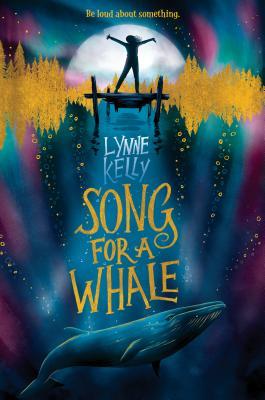Reviewed by Kimberly Christensen
Song for a Whale by Lynne Kelly
Middle Grade Fiction
 Sometimes a book just stops you in your tracks and demands that you sit with it, pushing aside as many demands of “real life” as you can in order to lose yourself in the book’s world. Song for a Whale is such a work, a middle grade book that is strongly and beautifully evocative of the longing for connection that all people–and perhaps all whales–feel, especially during those tender middle years when we are uncertain of who we are and so yearning to be seen by someone else.
Sometimes a book just stops you in your tracks and demands that you sit with it, pushing aside as many demands of “real life” as you can in order to lose yourself in the book’s world. Song for a Whale is such a work, a middle grade book that is strongly and beautifully evocative of the longing for connection that all people–and perhaps all whales–feel, especially during those tender middle years when we are uncertain of who we are and so yearning to be seen by someone else.
Twelve-year-old Iris is like most kids her age–caught in the middle of those awkward years when kids struggle to distinguish themselves from their family and yet desperately want to feel understood by their family members too. Iris happens to be profoundly deaf, and while able to lip read, is most comfortable signing, like her grandparents and her friend Wendell. Her mom and brother sign proficiently, but her father doesn’t, which leads to Iris feeling both misunderstood and unimportant.
Exacerbating this feeling is the fact that Iris is the only deaf kid at her school and relies heavily on an interpreter in order to manage at school, which makes it difficult for Iris to make friends that she can just be herself with. By comparison, Wendell attends a school for the deaf where he is immersed in deaf culture. Despite objections from her mother, Iris becomes interested in changing schools, even though she is simultaneously worried about making such a big shift.
Iris has taught herself to repair radios, and frequents the local junkyards and antique stores, looking for things to fix. Even as she restores the ability to produce sound to these machines, she herself does not seek to be able to hear. She experiences sound’s vibrations, but prefers to communicate through American sign language, with the nuance and poetry that hand motion brings to language. She and her grandfather, who passed away recently, played a poetry game using hand motions, and it was Iris’ favorite way of expressing herself.
In science class, Iris learns about “The Loneliest Whale in the World”–a whale that’s a hybrid of a blue whale and a fin whale, and who is named Blue 55. Blue 55 communicates at a different frequency than other whales. He’s being studied by scientists to determine why he uses the range that he does, and to learn more about his relationship–or lack thereof–with the pods that frequent the same places he does, but that don’t seem interested in having him as a member.
Iris is completely fascinated with Blue 55 and his plight. She knows exactly what it feels like to not havie the other whales understand your song. With the help of the school band, she creates a song for Blue 55 in his frequency, sending it to the lead researcher who is studying him. When she learns that the researchers plan to play it for him, Iris is compelled to try to join their expedition. But that will require traveling from Houston, where she lives, to Alaska, where Blue 55 is expected to migrate to in the summer.
After meeting with a solid “no” from her mother, Iris becomes more determined to travel to Alaska. She finds an ally in her grandmother, who is still reeling from her husband’s death and is looking for a purpose now that she is on her own. She books the two of them on a cruise to Alaska, understanding that Iris’ angst has as much to do with her ill-fitting middle school and her own sense of disconnection as it does with finding Blue 55. The two of them sneak off on a grand adventure, in which Iris learns as much about herself as she does about whales and conservation, and in which both Iris and Blue 55 find the connection they seek.
I cried my way through the last few chapters and recommend that you stop everything and read this lovely and poignant coming-of-age story. Five of five stars, plus a box of tissues.